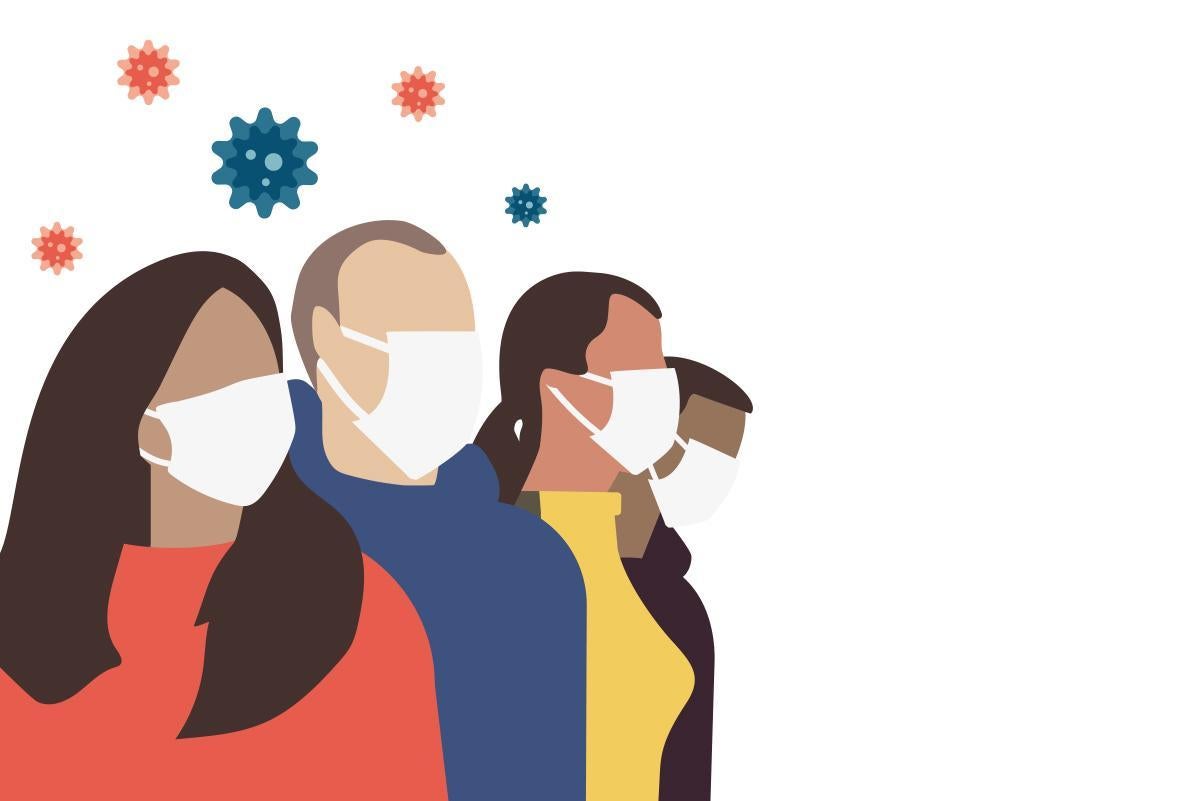DU Alumni Work on Colorado’s COVID-19 Health Equity Response Team

Just a few weeks into the COVID-19 pandemic, the State of Colorado realized it had a bigger issue to deal with than just the virus: People of color were being disproportionally impacted by the novel coronavirus, experiencing higher infection and death rates than white Coloradans. In response, Gov. Jared Polis established the COVID-19 Health Equity Response Team, which includes three University of Denver Graduate School of Social Work alumni among its 23 members.
Headed by the state’s Office of Health Equity and its director, Web Brown (a GSSW adjunct instructor), the team includes Priscilla Montoya Vitello, MSW ’12, director of strategy and learning for the Latino Community Foundation of Colorado; Maggie Gómez, MSW ’10, deputy director of the Center for Health Progress; and recent graduate Farduus Ahmed, MSW ’20, a grant and partnership administrator and community navigator at HOPE Communities. Their charge is “tackling these inequities to prevent the gaps from widening and ultimately saving lives.”
Specifically, the team’s work includes ensuring that COVID-19 data related to race and ethnicity are accessible, transparent and used in decision-making. They’re recommending measures to prevent the spread of COVID-19, working to increase access to testing and health care, and developing policy recommendations. Team members also share critical frontline information about how Colorado communities are experiencing challenges related to COVID-19.
For instance, in northeast Colorado — an infection hot spot — immigrant agricultural and factory workers are disproportionately affected. Access to health care is often limited in rural settings, and language and culture can create additional barriers. Fears related to cost or immigration status may prevent people from getting tested or seeking care. And, in a single meatpacking plant, where close quarters can foster infection, employees may speak more than 20 different languages — a challenge for sharing information about safety and worker rights, explains Gómez, who also chairs Colorado’s Health Equity Commission. “We’re trying really hard to make information accessible. We want to make sure people know their rights, that they’re protected, and we’re supporting policies that protect workers.”
“Among undocumented folks, there’s a heightened mistrust of the government. They’re concerned about getting tested and about the information being collected at testing sites,” adds Montoya Vitello, whose concentration was in Organizational Leadership and Policy Practice (OLPP). Following recent racial justice protests, she says, some communities were concerned about being tested for fear that information collected would be used to investigate who participated in protests. She couldn’t get a clear answer from the city or state to address those fears. So, she says, “What I’ve done is figure out what information is being collected and where that information is going.”
In addition to specific concerns like these, there are broader, entrenched systemic issues to address, team members say. According to the Response Team website, “People of color are disproportionately likely to be exposed to the virus in low-paying ‘essential’ jobs; are more likely to have limited access to affordable healthcare, childcare, and transportation; are more likely to live in neighborhoods with high air pollution rates; and are more likely to face unsanitary conditions in prisons, jails, and detention centers. Due to these types of inequities, people of color face chronic disease health disparities, leaving them with a higher risk of dying due to COVID-19.”
People of color are at higher risk of contracting the virus, too. For example, Montoya Vitello says, Latinos comprise 22% of the Colorado population but nearly 38% of COVID-19 cases. Simply getting sick can mean lost wages, lost jobs and declining health and well-being.
“People are worried every day that DACA is going to be taken away and they’re going to lose everything,” adds Gómez, who earned an MSW certificate in Latinx Social Work alongside her OLPP concentration. “Then you add a pandemic, and police brutality against Black and Brown people — all these things trickle downstream. We have to fight all of these different things at once.” The micro and macro collide, she says, when systemic issues meet day-to-day concerns, like paying rent or feeding your family.
The response team met weekly throughout the spring and quickly began addressing urgent needs for multilingual health outreach and information, including producing fact sheets on COVID-19 and racism and masks. “Not everyone speaks English, uses social media or watches TV,” explains Ahmed, whose concentration was in Mental Health. In some cases, information is needed via video, because not everyone can read. In the early days of the pandemic, she says, immigrants didn’t know where to turn for reliable information about COVID-19 testing, symptoms or care. Among the immigrant population Ahmed works with, people may not call 911 for an emergency because of language barriers, or they may be unfamiliar with the concept of “primary care” and thus go to the emergency room for issues that could be better handled in a doctor’s office.
The team also made several legislative recommendations. Although a bill to ensure that essential employees receive workers’ compensation due to risk of exposure to COVID-19 was defeated in June, the state now requires that all workers — regardless of status, industry, or form of employment — are able to earn paid sick leave. And, a bill was passed in June providing whistleblower protection for employees filing complaints against employers that don’t comply with public health orders; it has been sent to the governor.
“We need to honor the moment we’re in and what people need today and build a platform for an equitable recovery for Colorado,” Gómez says.
“The recommendations coming out of this team are really not new,” adds Montoya Vitello, noting that response team members are long-time activists and advocates. “We know our charge, but we also know it’s broader than that. These inequities back go 600 years or longer. There’s a history of systemic racism in our country that’s important to bring to the forefront.”








